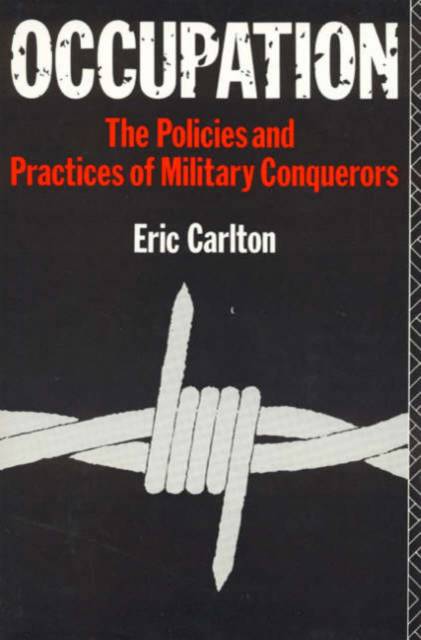
- Retrait gratuit dans votre magasin Club
- 7.000.000 titres dans notre catalogue
- Payer en toute sécurité
- Toujours un magasin près de chez vous
- Retrait gratuit dans votre magasin Club
- 7.000.0000 titres dans notre catalogue
- Payer en toute sécurité
- Toujours un magasin près de chez vous
124,45 €
+ 248 points
Format
Description
How does a successful conquering power retain control of the land it occupiesóoften in the face of hostility? In Occupation, Eric Carlton explores the methods employed by dominant powers to ensure their supremacy and considers the critical relationship between military authority and civilian population.
In exploring this complex relationship, Dr. Carlton covers both the nature of control and its practical implementation. Working from the premise that the ideology of the occupying power conditions the exercise of power and that control is gained either by compulsion or persuasion, he examines the options available to the aggressor nation in maintaining authority. These, he suggests, include both the use of force and the implementation of forms of social controlólegal, moral and religious preceptsóas well as the utilization of the social norms of the occupied nation. In order to demonstrate the wide variety of control policies used, Dr. Carlton presents a spectrum of case studies, with examples ranging from the Roman Empire to British colonialism in India and the exploitation of Peru by the Spanish. Particular attention is given to the Nazi atrocities of the Second World War, and to the moral aspects of military repression. Contents: Foreword; Introduction: Ideology and Control; Analyses of Power; Assimilation: The Expedient Policies of the Roman Empire; Re-education: British Colonialism in India; Culturation: The Neo-colonialism of the United States in Latin America; Reconstitutionalization: The Macedonian Empire of Alexander the Great; Malintegration: Japan and the Greater East Asia Co-Prosperity; Abritrary Repression: Mussolini and the Italian African Empire; Exploitation: The Spanish in Peru; Subjugation: Europeans and the Indigenes of North America; Depredation: The Assyrians and Population Transfer; Selective Control: Nazi Non-Eastern Occupation Policies; Extermination: Nazi Policies and Practices in the "East"; Excursus: The Holocaust and the SS Intelligentsia; Afterthough
In exploring this complex relationship, Dr. Carlton covers both the nature of control and its practical implementation. Working from the premise that the ideology of the occupying power conditions the exercise of power and that control is gained either by compulsion or persuasion, he examines the options available to the aggressor nation in maintaining authority. These, he suggests, include both the use of force and the implementation of forms of social controlólegal, moral and religious preceptsóas well as the utilization of the social norms of the occupied nation. In order to demonstrate the wide variety of control policies used, Dr. Carlton presents a spectrum of case studies, with examples ranging from the Roman Empire to British colonialism in India and the exploitation of Peru by the Spanish. Particular attention is given to the Nazi atrocities of the Second World War, and to the moral aspects of military repression. Contents: Foreword; Introduction: Ideology and Control; Analyses of Power; Assimilation: The Expedient Policies of the Roman Empire; Re-education: British Colonialism in India; Culturation: The Neo-colonialism of the United States in Latin America; Reconstitutionalization: The Macedonian Empire of Alexander the Great; Malintegration: Japan and the Greater East Asia Co-Prosperity; Abritrary Repression: Mussolini and the Italian African Empire; Exploitation: The Spanish in Peru; Subjugation: Europeans and the Indigenes of North America; Depredation: The Assyrians and Population Transfer; Selective Control: Nazi Non-Eastern Occupation Policies; Extermination: Nazi Policies and Practices in the "East"; Excursus: The Holocaust and the SS Intelligentsia; Afterthough
Spécifications
Parties prenantes
- Auteur(s) :
- Editeur:
Contenu
- Nombre de pages :
- 208
- Langue:
- Anglais
Caractéristiques
- EAN:
- 9780389209812
- Date de parution :
- 13-03-92
- Format:
- Livre relié
- Format numérique:
- Genaaid
- Dimensions :
- 163 mm x 239 mm
- Poids :
- 489 g

Les avis
Nous publions uniquement les avis qui respectent les conditions requises. Consultez nos conditions pour les avis.






